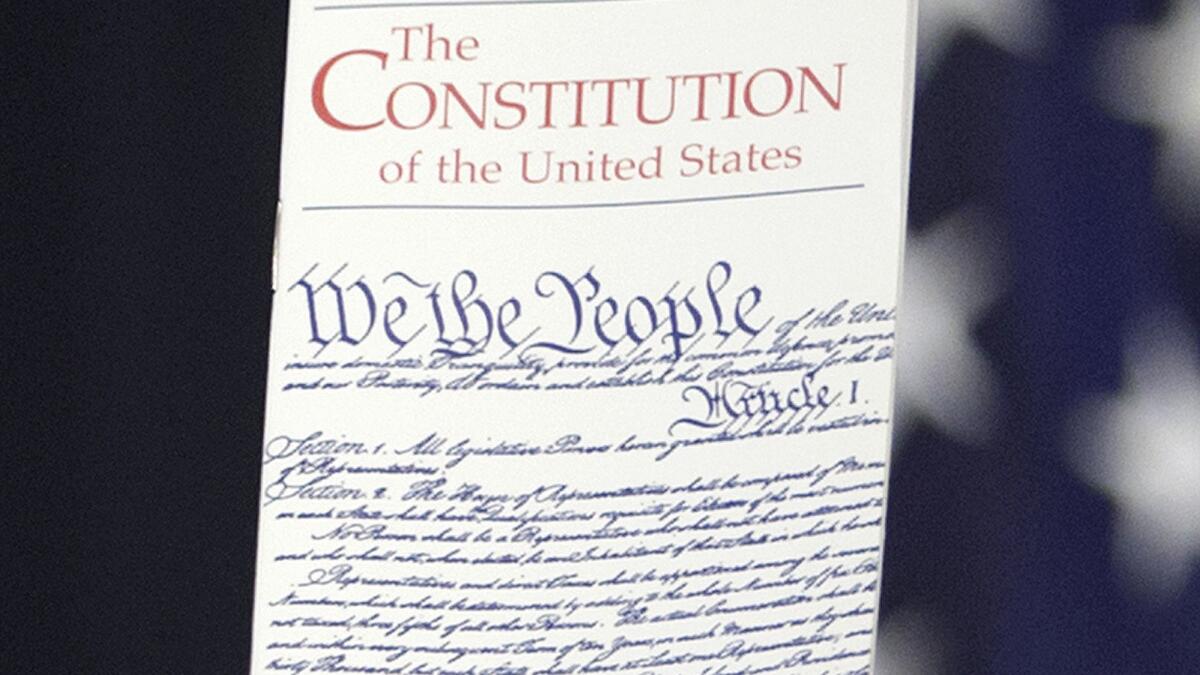Trump says no other country has birthright citizenship. That’s not even close to being true

In reviving the debate on birthright citizenship for children of those who immigrate to the U.S. illegally, President Trump on Tuesday claimed the nation is the “only country in the world where a person comes in and has a baby, and the baby is essentially a citizen of the United States for 85 years with all of those benefits.”
That’s far from true.
The U.S. is among more than 30 countries that give automatic citizenship to children born to nearly anybody living within a country’s borders, according to the National Constitution Center, which was established by Congress to educate Americans about the Constitution.
“In the early 17th century, the principle of birthright citizenship was established pretty definitively in England and that was exported to a number of British Empire colonies, including America,” said Bernadette Meyler, a professor at Stanford Law School.
Today, birthright citizenship, with few exceptions, is the norm in countries whose laws were crafted based on English common law, including Canada, Jamaica and Pakistan. Nearly every country in Central and South America provides birthright citizenship, too.
At the same time, several nations have been moving away from birthright citizenship, many in response to immigration. India, which once allowed birthright citizenship, gradually began doing away with it in the 1980s and almost completely ended it in 2004. Today, the law requires that children be granted citizenship only if a parent is a citizen. Australia, New Zealand and the Dominican Republic have also chipped away at birthright citizenship over the decades.
And since the 1980s, the United Kingdom, the source of the birthright tradition, has imposed a rule that a child must have one parent who is a citizen in order to receive citizenship. Other countries in Europe also generally do not allow birthright citizenship.
Birthright citizenship in the U.S. is based on the 14th Amendment, which was adopted after the Civil War to address the rights of freed slaves. It invalidated the Supreme Court’s 1857 Dred Scott case, which said descendants of African slaves were not citizens.
The citizenship clause of the amendment says, “All persons born or naturalized in the United States, and subject to the jurisdiction thereof, are citizens of the United States and of the State wherein they reside.” The law was reaffirmed in a 1898 Supreme Court case, which held that birthright citizenship was already common law before it was written into the Constitution.
But in the U.S. and elsewhere, illegal immigration has brought debates over changing citizenship requirements. According to the Pew Research Center analysis of government data, 275,000 babies were born to immigrants living in the U.S. illegally in 2014.

“The same debate that is now happening here has been going on elsewhere for the same reasons,” Meyler said.
Here’s a sampling of how the U.S. compares to other nations on citizenship requirements.
Canada
Anyone born in Canada is a citizen, regardless of their parents’ citizenship. The country’s Conservative Party has complained about the law and what it describes as “birth tourism,” when pregnant women come to Canada so their children will gain citizenship. But the party had been unsuccessful in changing the rule.
Mexico
Mexican law says that anyone born “within the Republic’s territory whatever their parents’ nationality might be” is a Mexican national. Mexico does not consider people to be citizens — even if their parents are — until they turn 18, which is when they can vote, hold office or join the military.
Israel
The country is unique for its citizenship rules. The Law of Return, in place since 1950, allows any Jew the right to immigrate to Israel and become a citizen. But a child born in Israel is a citizen only if a parent has citizenship.
France
Children born in France to foreign parents are not automatically citizens. But they become citizens when they turn 18, as long as they have lived in the country for five years since age 11.
Germany
A child born to a non-German citizen can be a citizen from birth only if a parent has been in the country for eight years with the legal status of “unlimited residency.” Children are also allowed to keep their parents’ citizenship until age 21, if the other nation allows it, though there are exceptions that allow dual citizenship for longer.
Japan
Unlike the U.S. or European nations that tend to allow a mix of citizenship by birth and by blood, Japan’s strict rules give children citizenship only if born to a Japanese national. There are a few exceptions, including cases where a parent’s nationality cannot be determined.
Brazil
South America’s most populous country is similar to the U.S. in bestowing citizenship to any child born within its borders.
Australia
Until 1986, anyone born in Australia was a citizen. Today, children become citizens at birth only if a parent is a citizen or permanent resident.
China
In the vast majority of cases, a newborn gets citizenship only if a parent is a Chinese national.
Twitter: @jaweedkaleem
More to Read
Start your day right
Sign up for Essential California for news, features and recommendations from the L.A. Times and beyond in your inbox six days a week.
You may occasionally receive promotional content from the Los Angeles Times.







